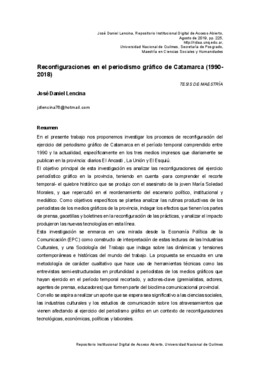Reconfiguraciones en el periodismo gráfico de Catamarca (1990-2018)
Fecha
2019-08-09Autor
Lencina, José DanielResumen
The present research aims to investigate the reconfiguration of journalism practices in Catamarca in the period between 1990 and the present, specifically in the three printed media that are daily published in the territory: newspapers El Ancasti , La Unión and El Esquiú.
The main objective of this investigation is to analyze the reconfigurations of the written journalism practices in the province, taking into account the historical break that occurred with the murder of the young lady María Soledad Morales that reverberated in the reordering of the political, institutional and media scenario. The specific objectives are: to analyze the productive routines of the journalists of the written media of the province; to investigate the effects of newsletters on the reconfiguration of these practices; and to analyze the impact produced by new technologies in this sense.
This research is included in an understanding of the Political Economy of Communication (PEC) as an interpretation of Cultural Industries, and a Labour Sociology that investigates the dynamics and contemporary tensions of the world of work. This proposal is framed in a qualitative methodology that makes use of techniques such as in-depth semi-structured interviews to journalists of the written media that have worked in the cut-off period, as well as to key-actors (unionists, press agents, professors) that belong to the provincial communication environment.
This aims to make a significant contribution to social sciences, cultural industries and communication studies, on the circumstances that affect the practice of written journalism in a context of technological, economic, political and labor reconfigurations.

